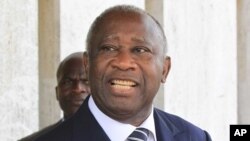Ivory Coast's incumbent government says it is not intimidated by threats to be removed from power by a regional intervention force. West African leaders have replaced the head of the region's central bank to further isolate the incumbent president in favor of the internationally-recognized winner of November's vote.
Supporters of Ivory Coast's incumbent president Laurent Gbagbo say threats of a regional military force to remove Mr. Gbagbo are part of an elaborate bluff to force him from power and install the United Nations certified winner of the presidential election, former prime minister Alassane Ouattara.
No legal standing
Gbagbo spokesman Ahoua Don Mello says regional leaders know they have no legal standing to raise such a force against an incumbent government.
Don Mello says no foreign army can legally attack Ivory Coast. If West African leaders want to go with the use of force or make a declaration of war, then what have they achieved? he asks. Are they going to declare war? Don Mello says it is all a bluff.
Military intervention
Ivory Coast is home to many civilians from countries likely to contribute to a regional force, and West African leaders say they are mindful that their citizens might then be attacked by pro-Gbagbo militants. The army's continued loyalty to Mr. Gbagbo further raises the risks of military intervention.
Army Chief of Staff, General Philippe Mangou, told a Gbagbo rally Sunday that soldiers will never desert Mr. Gbagbo.
Mangou says the army has told everyone that, having been in the field, soldiers do not want war because they have destructive weapons and know their effects.
Isolation
While continuing to discuss a regional intervention force, West African leaders are moving to further isolate Mr. Gbagbo economically.
They announced last month that they were cutting Mr. Gbagbo's access to Ivorian accounts at the regional central bank. But the Gbagbo government continued to use state funds, chiefly because central bank governor Philippe Henri Dacoury-Tabley is a Gbagbo ally.
When West African leaders finally forced Tabley to resign at an emergency meeting in Mali Saturday they said Mr. Ouattara will name Tabley's replacement.
Gbagbo spokesman Don Mello says Mr. Gbagbo is ignoring the central bank move.
Mello says the Gbagbo government does not recognize the decision taken by heads of state in Mali, and the central bank branch in Abidjan is still under its control. Mello says the Gbagbo government is prepared to withstand any economic sanctions.
He adds that the Gbagbo government has long-anticipated all possible decisions that regional leaders could take against it. He says the proof of that preparation is that government salaries have already been paid.
Sanctions
The European Union has frozen the assets of Ivory Coast's main cocoa ports, its state oil firm, its main energy utility, its national broadcaster, and three banks because European leaders say those firms are helping to fund what they call an illegitimate government.
The U.S. treasury has frozen Mr. Gbagbo's accounts and banned Americans from doing business with his government.
Mr. Gbagbo's government says those economic sanctions will hurt foreign businesses more than Ivorians because they can buy manufactured goods from Asia and South America, but there is nowhere else in the world that has as much cocoa as Ivory Coast.
Gbagbo supporters are mocking Mr. Ouattara's call for a month-long ban on cocoa exports because the Gbagbo government controls Ivory Coast's cocoa fields, its ports, and the security to guarantee delivery while Mr. Ouattara is secluded in an Abidjan resort hotel guarded by U.N. peacekeepers.
Gbagbo Supporters Say Regional Leaders Bluffing About Military Intervention




